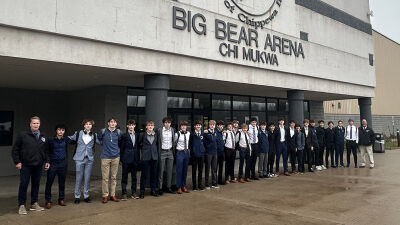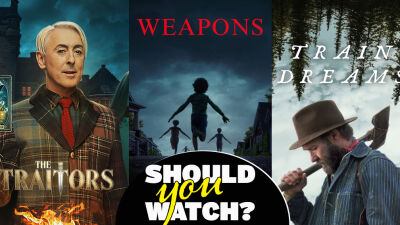METRO DETROIT — With the Screen Actors Guild-American Federation of Television and Radio Artists on strike, young future media professionals have had a lot to think about.
Students at Oakland University were generally supportive of the strike.
Brendan Kredell, an Oakland University professor and the director of the university’s film studies and production program, said the SAG-AFTRA strike was brought up on the first day of class in a course about the history of silent film.
“So you might think, we’re looking at a time period that took place a hundred-plus years ago and that seems (as) far from relevant as possible,” Kredell said.
He went on to say that when film was invented there was a lot that was unsettled and that many things needed to be invented so they could have the film and media industry they have today.
“A large part of that was trying to understand what the relationship between capital and labor was,” Kredell said. “And that was a long and sometimes very conflict-driven relationship.”
According to their website, SAG-AFTRA “represents approximately 160,000 actors, announcers, broadcast journalists, dancers, DJs, news writers, news editors, program hosts, recording artists, singers, stunt performers, voice over artists and other media professionals.”
“SAG-AFTRA members are the faces and voices that entertain and inform America and the world,” their mission states.
According to their website, the strike was ordered by SAG-AFTRA on July 13 and started at 12:01 a.m. on July 14. At press time Oct. 5, they were still on strike. As of press time, negotiations with the Alliance of Motion Picture and Television Producers were ongoing and were expected to proceed on Friday, Oct. 9.
According to the Writer’s Guild of America West, both the WGAW and the Writer’s Guild of America East went on strike at 12:01 a.m. on May 2 of this year. That strike ended on Sept. 27.
Kredell said he thinks the film and media industry is facing a similar upheaval that the inventors of cinema were facing.
“Which is the challenges and the opportunities presented by generative AI,” Kredell said. “And in the face of that, it should be hardly surprising that labor is responding the same that labor did during the silent era. Which is to organize and to try to assert its own power against capital in an effort to try and ensure it can carve out a living.”
The students in the class, Kredell said, came to see the historical significance as well. In his classes, the students have been generally supportive.
“I’m teaching today the students that will have those union jobs in a couple of years, ideally,” Kredell said. “And those are the very people who should be the most concerned whether or not the adoption of artificial intelligence and other various efficiency generating technologies is going to make it such that the total number of opportunities available in the media industries are lower in the future.”
In his film programming class, the students gave their opinions about the SAG-AFTRA strikes. The students in the class were from all different fields of study.
Zach Andrew, an acting major, said he’s excited the strikes are happening now rather than when he’s entered the industry.
“I support them because if I talk to some people that don’t know as much and they take that these are millionaires complaining that they don’t get an extra five, ten million (dollars),” Andrew said. “But these are average people who are just like us, who are just trying to make a living doing what they love.”
Shane Strong, a film production major, said that he hopes the VFX artists go on strike next. He recalled later on a video essay that stated if the AI precedent set up by the higher ups at the studios goes through, the higher ups are next because there would be programs that know what movies to greenlight.
“I feel like if I was on a board and I’m paying millions, $20 million a year to some guy to greenlight movies and such, you know, I’m either going to get rid of him or pay less,” Strong said.
Falon Harris, a social work major, said she likes the fact that they are on strike. She said those that support the strike have to understand the confusion when it comes to people who might not understand that the actors on strike aren’t celebrities, and they feel strongly about the opposite.
“I like that they’re on strike,” Harris said. “But also, I do understand the conversation about why it’s interesting to have and why people might not get the point because it is really hard to understand unless you (are), like, in it or you understand it.”
Kredell is worried about the strikes for a few different reasons. One of those worries has to do with “what this means for the long-term sustainability of the industry.” He also said it’s a different kind of worry than it has been in the past.
“Because the players around the table are not the same,” Kredell said.
He went on to say that the players were the same in the 1920s as they were in the 2000s.
“What’s different today is that it’s not only Paramount and Warner’s (Warner Bros.) and Universal, but it’s also Apple and Amazon and Netflix,” Kredell said. “They weren’t even a part of this conversation really the last time that this happened.”
This creates further uncertainty about the outcome of the strikes.
“We don’t know, I think, what to expect because the business models of those companies are completely different than those of the mainline entertainment companies,” Kredell said.
 Publication select ▼
Publication select ▼





























